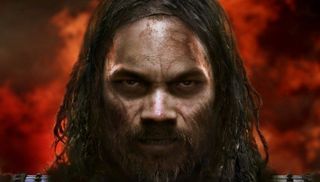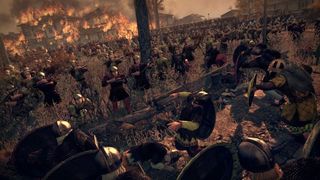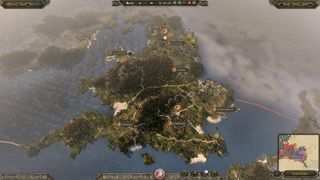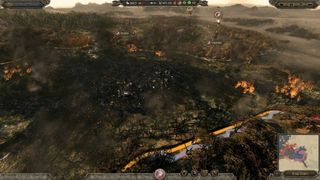Total War: Attila

"I wouldn't call it an expansion," says Janos Gaspar, lead designer of Total War: Attila. "It's a new thing." The difference is small, but notable. Attila runs on a slightly upgraded version of Rome 2's Warscape engine, and features the mighty empire in a prominent role. But from Creative Assembly's perspective this isn't Rome 2's Fall of the Samurai. It's a new thing; an attitude likely born from the community's wide-ranging issues with Rome 2, and the ways in which Attila attempts to address them.
They may have a point. Attila offers plenty of campaign and battle improvements; from the return of the family tree system, to an overhauled model of siege warfare. More than that, though, it does things never before attempted in a Total War game. For one, you can start in a position of power—your objective to hold onto land rather than expand into more. For another, it has an antagonist.
History, meet Attila the Hun. You're going to get along famously.

Total War: Attila starts in 395 AD, over 360 years after the end of Rome 2's main campaign. The Roman Empire has split in two, East and West, and these separate factions cover the majority of Europe and beyond. They're big, and long overdue a fall. Creative Assembly call Western Rome their first "Legendary" starting position. Select it, and you'll begin with an abundance of territory and soldiers. Far from being a strong beginning, you'll be under fire from all sides. Where can you afford to lose ground? Where must you defend at all costs? With limited resources, and a force reliant on undisciplined barbarian mercenaries, you'll need to make tough decisions if you're to retain your dominance.
Into this maelstrom, Attila is born. Creative Assembly didn't show the Huns in action, but it's clear their arrival will be an apocalyptic event within the game's campaign. At this point in history, Rome and its surrounding barbarian tribes are predominantly Christian. "These early Christians looked at Attila and the events that Attila brought as the Horsemen of the Apocalypse," says Gaspar, referring to the prophecy of the Book of Revelation. "They are the biggest force that drive most of the barbarian tribes into the borders of the Roman Empire."
The Book's 'Seven Seals' will denote stages of the game. "Someone will be born, someone will come, someone will bring the end of days," says Gaspar. "As these seals are coming—as these omens are getting more and more frequent—Attila is essentially leading the Horsemen."

It's the end of the world as Rome knows it, but for players, things will be more immediately familiar. The campaign map is a clear evolution of Rome 2's beautifully detailed dioramas. Even the camera's had an upgrade—letting you zoom out further for a fuller look at your empire. It's a small change, but one that makes the world feel more open and less claustrophobic.
PC Gamer Newsletter
Sign up to get the best content of the week, and great gaming deals, as picked by the editors.
The campaign's other features are more dramatic. Here's an obvious one: the family tree is back. "We take out and put away features based on the game," Gaspar says, citing Empire as an example of a Total War game too grand to support the feature. Attila, he counters, is more focused—especially in its time scale. As such, familial management is making what's sure to be a welcome return.
Players will not only be able to nurture their heir, marry their bachelors and navigate their internal intrigue, but also nominate governors from both in and outside of the family. These statesmen are tied to specific provinces—their traits and skills offering bonuses to the areas they're assigned. They also act as generals for garrisoned forces, offering extra protection for threatened provinces. "Put a level ten general into a province," says Gaspar, "and he can provide a very good defence with his skills and abilities."

To counter this, siege tactics have been more fully developed. "Previously sieges were quite contained," says Gaspar, "and relatively short in terms of the campaign. Now sieges last for years." The length of the siege affects a city's defensive potential. Attack instantly and the settlement will be pristine and difficult to conquer. Wait six or seven turns, and decay will set in. "There are corpses everywhere, and some buildings are destroyed. At that point it will be easier, or you can wait even more. You get into a level of escalation where there are breaches."
This was the state of the settlement I was given to defend. Creative Assembly's hands-on demo featured a single battle against overwhelming attackers. My walls were crumbling, my buildings were fragile and my men were outnumbered. It was a valiant defeat—my ultimately doomed troops taking out far more of the opposition than they had any right to. That was thanks in part to the new barricades. Before a battle, you can set up a limited number of barricades across pre-marked positions. Troops can then be moved to occupy these spaces. For attackers, it becomes a tower defence style gauntlet. Pushing through the barricade will take time, but moving around lets the defender funnel their opponent into a more disadvantageous position.
This, I think, will be the test of Attila's AI. In the few battles I attempted, the computer successfully countered my attempts to hem it in. But as players grow familiar with the system, I can see exploits emerging. Total War is a series that has consistently struggled with its AI. Hopefully this new feature won't prove the new game's undoing.

If a multi-year siege isn't to your liking, there are more insidious ways to weaken your foes. As the world moves towards the dark ages and the larger settlements fill with people, urban squalor becomes a more pressing concern. Previously, squalor was part of a province's general happiness. Now it's been separated out. Poor conditions can lead to diseases, each with its own severity and infection rate. Your agents can help build squalor, and your troops can carry disease. "If you're not careful about disease," says Gaspar, "then your entire empire can can come to a halt. Or you can do it to someone else."
Attila's other trick is to let you deny the enemy their gains. If you're up against an insurmountable force, you'll be able to take a scorched earth approach. "You can raise a settlement and destroy it," says Gaspar. "If you do it willingly you get some money, but that settlement is disabled. It's desolate territory. There's no settlement." Raised settlements can be rebuilt, but it's time consuming and costly. Nevertheless, the desolate mark it leaves is the perfect visual accompaniment to any approaching apocalyptic horde.
In all, Total War: Attila is a strange proposition. Through its titular antagonist's role, the campaign sounds more closely defined than past games. And yet, in this way, the game also distances itself from Rome 2—despite the familiarity of its units and aesthetic. It's trying something different, even as it's improving on things that were the same. At the very least, it's added and reintroduced systems should satisfy those unhappy with Rome 2's more streamlined strategy.

Phil has been writing for PC Gamer for nearly a decade, starting out as a freelance writer covering everything from free games to MMOs. He eventually joined full-time as a news writer, before moving to the magazine to review immersive sims, RPGs and Hitman games. Now he leads PC Gamer's UK team, but still sometimes finds the time to write about his ongoing obsessions with Destiny 2, GTA Online and Apex Legends. When he's not levelling up battle passes, he's checking out the latest tactics game or dipping back into Guild Wars 2. He's largely responsible for the whole Tub Geralt thing, but still isn't sorry.
Most Popular


